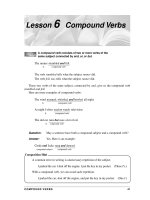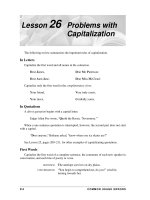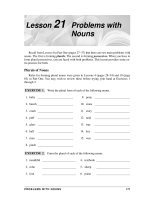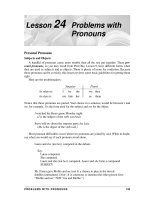Grammar And Usage For Better Writing - Problems with Nouns
Bạn đang xem bản rút gọn của tài liệu. Xem và tải ngay bản đầy đủ của tài liệu tại đây (56.78 KB, 22 trang )
Recall from Lesson 4 in Part One (pages 27–37) that there are two main problems with
nouns. The first is forming plurals. The second is forming possessives. When you have to
form plural possessives, you are faced with both problems. This lesson provides some ex-
tra practice for both.
Plurals of Nouns
Rules for forming plural nouns were given in Lessons 4 (pages 28–34) and 10 (page
63) in Part One. You may wish to review these before trying your hand at Exercises 1
through 3.
EXERCISE 1.
Write the plural form of each of the following nouns.
1. baby 9. pony
2. bunch 10. stone
3. crash 11. story
4. puff 12. tank
5. glass 13. tray
6. half 14. key
7. miss 15. wax
8. pinch
EXERCISE 2.
Form the plural of each of the following nouns.
1. mouthful 4. textbook
2. echo 5. sheep
3. foot 6. piano
PROBLEMS WITH NOUNS 171
Lesson
21
Problems with
Nouns
7. roof 9. potato
8. hero 10. tooth
EXERCISE 3.
Write the plurals for these nouns.
1. strawberry 6. saleswoman
2. chef 7. branch
3. government 8. attorney
4. bookshelf 9. family
5. radio 10 foot
Possessives of Nouns
The formation of possessive nouns was explained in Lesson 4 (pages 34–37) in Part
One. It may be a good idea to turn back to that lesson and review how to form singular and
plural possessives. Some practice exercises follow.
EXERCISE 4.
Write the singular possessive form of each of the following nouns.
1. animal 7. igloo
2. attorney-general 8. sister
3. brother 9. nurse
4. commander in chief 10. week
5. fox 11. man
6. girl 12. year
EXERCISE 5.
Write the plural possessive form of each of the following nouns.
Remember: First write the plural. Then add an ’ or s’ as needed.
1. athlete 5. goose
2. city 6. house
3. salesman 7. mouse
4. four-year-old 8. month
172 COMMON USAGE ERRORS
9. parent 11. tree
10. search 12. wolf
Now, practice forming both plurals and possessives in the next two exercises.
EXERCISE 6.
Write the singular possessive, plural, and plural possessive of each of
the following nouns.
SINGULAR SINGULAR POSSESSIVE PLURAL PLURAL POSSESSIVE
1. book
2. man
3. box
4. punch
5. calf
6. cage
7. pie
8. ox
9. mouse
10. deer
11. soprano
12. athlete
13. story
14. monkey
15. thief
EXERCISE 7.
Write the correct form of the noun in parentheses as required by the
sense of the sentence.
1. He left two of his (book) ____________________ on the bus.
2. The (book) ____________________ cover was torn.
PROBLEMS WITH NOUNS 173
3. Bill drove his (sister) ____________________ car.
4. The two (sister) ____________________ started two (business)
____________________.
5. I saw three (goose) ____________________ swimming in the pond.
6. The park ranger noticed that many of the (goose) ____________________ wings
were missing feathers.
7. Two of Mr. Dixon’s (daughter) ____________________ own a computer store.
8. The two (daughter) ____________________ store is on Main Street.
9. Both of my (brother) ________________ belong to the (school) ________________
basketball team.
10. Ten of the hotel’s (doorman) ____________________ worked on Sunday.
174 COMMON USAGE ERRORS
Every sentence has at least one verb. When you construct sentences, you have to pay
close attention to the verbs. You must choose the correct tense of the verb and make the
verb agree with its subject. The following discussion centers on these aspects of verbs. The
lesson ends with a review of some verb pairs that are especially troublesome.
Using the Correct Tense
Question:
What is “tense”?
Answer:
Tense means “time.”
The form of a verb shows the time of the action that the verb expresses. Be sure to use
the correct tense in your writing.
PRESENT TENSE
: A statue of Thomas Jefferson stands in
Washington, D.C.
PAST TENSE
: The Tampa Bay Buccaneers won the Super
Bowl in 2003.
FUTURE TENSE
: Taryn will go to the dentist at five o’clock
this afternoon.
PRESENT PERFECT TENSE
: The Pyramids have lasted for thousands of
years.
PAST PERFECT TENSE
: By late afternoon, all the guests had left.
FUTURE PERFECT TENSE
: By the year 2020, people’s taste in popular
music will have changed.
Staying with the Same Tense
A common mistake is to mix the present and the past in a sentence. Stick to the same
tense. Study the two examples to see how to correct errors.
MIXED TENSES
: I lose my keys and waited for my mother to come home.
present past
SAME TENSE
: I lose my keys and wait for my mother to come home.
present present
SAME TENSE
: I lost my keys and waited for my mother to come home.
past past
PROBLEMS WITH VERBS 175
Lesson
22
Problems with
Verbs
MIXED TENSES
: Because she misses the bus, she walked to school.
present past
SAME TENSE
: Because she misses the bus, she walks to school.
present present
SAME TENSE
: Because she missed the bus, she walked to school.
past past
EXERCISE 1.
The following sentences show inconsistent use of tense, mixing
present and past. Make each pair of verbs consistent.
In 1–3, make all verbs present tense.
1. I get up at 7:00
A
.
M
. and took a quick shower.
2. Children splashed in the neighborhood pool while the lifeguards watch carefully.
3. She turned off the soap opera as her brother comes through the door.
In 4–6, make all verbs past tense.
4. The school bus was late, but I get an excuse note from the driver.
5. We hike up the Mt. Greylock trail and rested on the summit.
6. I asked our football coach to put me in the game, but he says my arm isn’t rested enough.
In 7–9, make all verbs present tense.
7. Cai strolls into the cafeteria and sat down next to Page.
176 COMMON USAGE ERRORS
8. Alex walked confidently to the front of the room and speaks to the class.
9. My sister handed the clarinet to me and then cringes when I try to play it.
In 10–12, make all verbs past tense.
10. Ben thinks for a moment and then explained his point of view.
11. The 727 departed from O’Hare International Airport and then heads toward Atlanta.
12. The players slip up behind the winning coach and dumped a bucket of Gatorade on
him.
Principal Parts of Verbs
Question:
What do we mean by “principal parts”?
Answer:
The principal parts of a verb are those parts used to form tenses.
Except for helping verbs (can, be, may, have, etc.), all English verbs have four principal
parts—the infinitive (without the “to”), present, past, and past participle. In our language,
verbs can be regular or irregular.
Regular Verbs
Most verbs are regular. They form tenses (express time of an action) in regular,
predictable ways.
I play my music loudly.
(Expresses an action taking place or an action always true; play is present tense.)
I played my music loudly.
(Expresses an action gone by; played is past tense.)
I have played my music loudly.
(Expresses an action completed at the time of speaking; have played is a
helping verb, have, plus the past participle played.)
PROBLEMS WITH VERBS 177
Irregular Verbs
Some verbs are irregular. They cause trouble because they do not form their tenses in
the usual way.
I see a UFO.
(Expresses an action taking place; see is present tense.)
I saw a UFO.
(Expresses an action gone by; saw is past tense.)
I have seen a UFO.
(Expresses an action completed at the time of speaking; have seen is a
helping verb, have, plus the past participle seen.)
Principal Parts of Irregular Verbs
A speaker or writer of correct English must know the principal parts of irregular verbs.
For example,
WE DON
’
TSAY
: We swimmed to the shore.
WE
DO
SAY
:We swam to the shore.
WE DON
’
TSAY
: Mom has went to the office.
WE
DO
SAY
: Mom has gone to the office. (Has is a helping verb.)
WE DON
’
TSAY
: The girls have ate their lunch.
WE
DO
SAY
: The girls have eaten their lunch. (Have is a helping
verb.)
Here is a list of the trickiest irregular verbs. Study them thoroughly.
PRINCIPAL PARTS OF 40 IRREGULAR VERBS
PRESENT PAST PAST PARTICIPLE
am was (have) been
become became (have) become
begin began (have) begun
blow blew (have) blown
break broke (have) broken
bring brought (have) brought
catch caught (have) caught
choose chose (have) chosen
come came (have) come
do did (have) done
draw drew (have) drawn
drink drank (have) drunk
178 COMMON USAGE ERRORS









